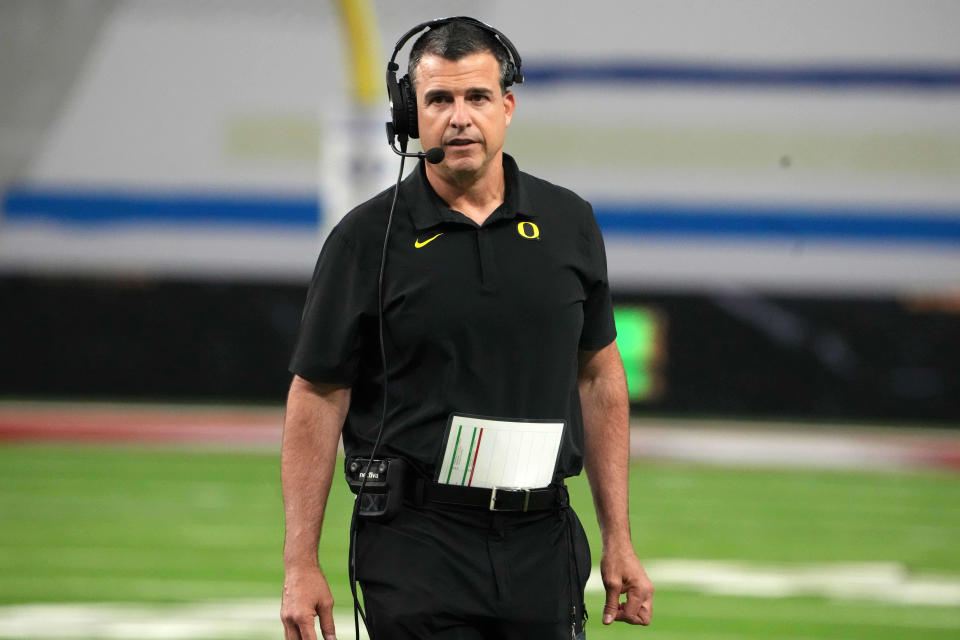How firing Manny Diaz, hiring Mario Cristobal could cost Miami an additional $27.7 million
- Oops!Something went wrong.Please try again later.
The University of Miami’s football head coaching moves of firing of Manny Diaz and hiring of Mario Cristobal on Monday could end up costing the school close to $28 million. And the 10-year, $80 million contract that multiple news media outlets have reported Cristobal as receiving could require millions more.
All of this is without counting what it will take to pay off Diaz’s staff, hire new assistants or make any of the other program improvements that usually follow a head coach’s firing.
The analysis is based on Miami’s most recent federal tax records, which strongly indicate how it handled a buyout when it hired Diaz away Temple University, and federal tax-law changes passed in December 2017 that included the creation of an excise tax on the pay of non-profit organizations’ most highly compensated employees.
As a private university, Miami is not subject to open-records disclosure. But it is organized as a non-profit, so it has to file a tax return with the IRS that provides some information about certain employees’ pay, including that of its five highest paid.

Miami’s most recently available return covers compensation paid during the 2019 calendar year. The school announced Diaz’s hiring from Temple on Dec. 30, 2018. It said on the tax return that Diaz had total compensation of nearly $9.7 million for 2019, nearly $9.3 million of which was categorized as reportable compensation actually paid to Diaz in 2019 other than base salary or bonus money. Supplemental information provided by the school on the return said that it had covered the cost of tax payments for Diaz.
That points to Miami treating the buyout to Temple – which multiple media outlets have placed at $4 million – as taxable income to Diaz and then paying the taxes owed, said Meghan R. Biss a tax attorney in the Washington office of Caplin & Drysdale who previously worked as the technical adviser to the IRS’ director of exempt organizations.
Miami declined to comment on any aspect of the compensation it reported for Diaz when it provided the tax return to USA TODAY Sports in April. A spokesman for the school did not respond to a request for comment Monday.
There are several ways that a school can deal with paying a buyout on behalf of a coach it hires, including claiming the amount as a business expense. This generally involves also agreeing to cover the coach if it is later determined that taxes are owed, since the handling of these buyouts is not a fully settled tax-law matter.
MORE MONEY: $11.6 million and rising: Bonuses earned by college football coaches this season
BOWL DAYS: Complete college football bowl schedule for the 2021 season
But with Miami appearing to have used the buyout-as-taxable-income method with Diaz, Biss said, “it would be hard to take a different approach” with Cristobal.
Using a standard way to make a basic calculation of the taxes owed in connection with a buyout, a formula involving the federal income and Medicare tax rates is applied (there is no state income tax in Florida). It results in taxes of about $5.6 million. Biss said some strategies can be used to lower the amount or stretch it out over time, but “there is going to be tax consequence no matter how they do it.”
And, Biss points out: “Schools are more interested in high-performing coaches than (they are in) the tax consequences that will derive from the transaction. There are enough dollars involved for the university that I don’t think the tail is going to be wagging the dog in terms of what they’re going to pay in taxes having an effect on how to structure” the deal.
This is where the excise tax comes into play. It imposes a 21% levy on compensation above $1 million – including bonuses – that goes to any of a non-profit’s five highest-paid employees in a year. It was intended to cover all non-profits, but a hole in its drafting resulted in Treasury Department and IRS regulations that say some public universities don’t have to pay while all private schools do.
With Cristobal’s $9 million buyout, the $5.6 million in taxes on that likely being paid on his behalf and roughly one month of compensation that multiple news media outlets have placed at an annual rate of $8 million, his total compensation from Miami for 2021 would be about $15.6 million. With $14.6 million subject to the 21% tax, that’s roughly $3 million more.

See salaries for college football coaches through the years
Altogether, not counting the month’s gross pay, that’s $17.6 million related to bringing Cristobal aboard.
Now for the implications of Diaz’s departure.
Multiple news media reports have placed the buyout that Miami owes him for the remainder of his contract at $8 million. Even if that amount is actually paid to Diaz over time, because it is certain he will receive that amount, IRS rules require the entire amount to be counted in 2021 for excise-tax purposes. Add in the amount that Miami already has paid Diaz this year – conservatively, $3 million – and Miami will owe an excise tax equal to 21% of $10 million for Diaz, or $2.1 million.
That’s $10.1 million related to letting Diaz go.
And $27.7 million as the grand total.
This article originally appeared on USA TODAY: Hiring Mario Cristobal, firing Manny Diaz will cost Miami millions

